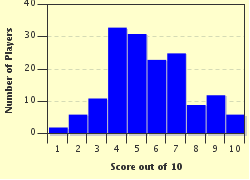Quiz Answer Key and Fun Facts
1. In the 15th century CE Malaya was ruled by kings of which Sultanate/Empire?
2. From the point of view of nation-building what was the significance of the French Revolution?
3. Which of these events led directly to the formation of a new nation?
4. After World War I new nations were formed or re-established in Europe. Name one of them.
5. What was the key aim of Woodrow Wilson's Fourteen Points?
6. Who was one of the key figures of Italy who wanted to unite Italy in the 1860s?
7. In 1870 French forces withdrew from Rome. Why?
8. What characterized the policy introduced by Otto von Bismarck's plan to unify Germany?
9. How many wars did Bismarck fight in order to unify Germany?
10. What were the similarities between the founding of Medina and the formation of Malaysia?
Source: Author
WW2Master123
This quiz was reviewed by FunTrivia editor
bloomsby before going online.
Any errors found in FunTrivia content are routinely corrected through our feedback system.


